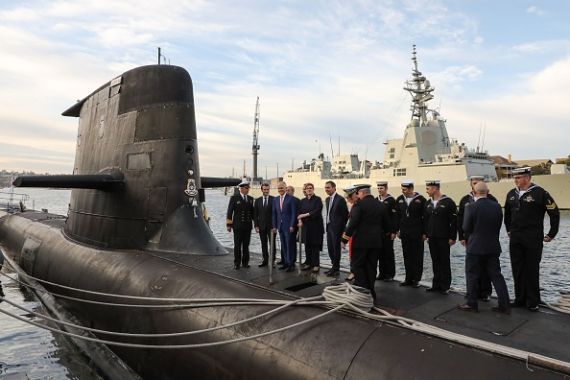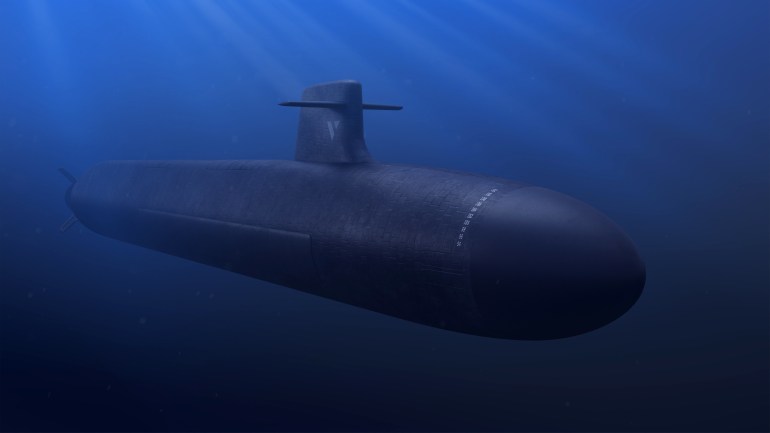How a submarine deal sparked a major diplomatic crisis
Australia’s move to ditch a $66bn submarine deal has spiralled into an unprecedented diplomatic row between Western allies.

Australia’s decision to cancel a multibillion-dollar order for French submarines in favour of American and British technology has sparked a diplomatic row of unprecedented proportions between longtime Western allies.
The French foreign ministry recalled its ambassadors to the United States and Australia citing “duplicity, disdain and lies”.
Keep reading
list of 3 itemsHundreds arrested in Australian anti-lockdown protests
France accuses Australia, US of ‘lying’ over submarine deal
Alongside the economic damage for tens of billions of euros, France said it resents the way Australia and its partners have handled the matter. French Foreign Minister Jean-Yves Le Drian, said, “There has been contempt so it’s not going well between us, not at all.”
President Emmanuel Macron will have a call with his US counterpart, Joe Biden, in the next few days, the French government said on Sunday.
Australia’s strategic alignment
Australia announced on Wednesday it would ditch a contract worth more than 50 billion euros ($59bn) to acquire 12 French-made diesel-electric submarines.
Instead, it will commission at least eight US nuclear-powered submarines in the framework of a new alliance – known by its acronym AUKUS – which will see Australia, the US, and the United Kingdom share advanced technologies with one another.
Australian Prime Minister Scott Morrison on Wednesday said the three nations had agreed to “a new enhanced trilateral security partnership”.
The move consolidates Australia’s strategic alignment with the US and could alter the naval balance of power in the Pacific. As part of the plan, Australia may conduct routine patrols through areas of the South China Sea.
Biden said the deal was “about investing in our greatest source of strength, our alliances, and updating them to better meet the threats of today and tomorrow”.
The partnership, however, cuts France out of the procurement deal it won in 2016 over offers from Germany and Japan. The US and the UK had not taken part in the bidding process.
‘Lies and deceit’
Le Drian and Armed Forces Minister Florence Parly expressed their anger at Australia’s move on Thursday, saying the “decision is contrary to the letter and spirit of the cooperation that prevailed between France and Australia”.
Speaking on France Info radio on Thursday, Le Drian described the decision as “a stab in the back”.
Jean-Pierre Thebault, French ambassador to Australia, told Al Jazeera as he left the embassy in Canberra the move to scrap the deal “has been a huge mistake”.
“It was not a contract, it was a partnership,” he said of the deal. “Partnerships are supposed to be based on trust.”
Le Drian on Saturday denounced what he called the “duplicity, disdain and lies” surrounding the sudden end of the contract, which he suggested was the result of a backroom deal that betrayed France.
Australia’s Morrison said on Sunday that France would have known Australia had “deep and grave concerns” that a submarine fleet the French were building would not meet Australian needs.
He said he told Macron in June there were “very real issues about whether a conventional submarine capability” would address Australia’s security concerns.
While he avoided making specific reference to China, Morrison blamed the switch on a deteriorating strategic environment in the Asia Pacific.
“The capability that the Attack class submarines were going to provide was not what Australia needed to protect our sovereign interests,” he said.
Australia’s Defence Minister Peter Dutton said his country has been “upfront, open and honest” with France about its intention to acquire its first nuclear submarines, which are not expected to be delivered until close to 2040.
Le Drian denied claims there had been advance consultations with France before the announcement on Wednesday, saying “this isn’t true”.
Historic alliance in tatters?
The alliance between France and the US dates back to 1778, two years after the US declaration of independence.
As part of the Franco-American alliance, France provided the US with critically needed military aid and loans during its revolutionary war against the UK.
France, the US’s oldest ally, had never before recalled its ambassador.
“The fact that for the first time in the history of relations between the United States and France we are recalling our ambassador for consultations is a serious political act, which shows the magnitude of the crisis that exists now between our countries,” Le Drian said in a statement on Friday.
The French foreign minister said France would make a priority of developing a European Union security strategy when it takes on the bloc’s presidency at the start of 2022.
A White House official said on Friday the US regrets France’s decision to recall its ambassador and will continue to be engaged in the coming days to resolve differences between the two countries.
“President Biden asked to speak to the president of the republic and there will be a telephone discussion in the next few days between President Macron and President Biden,” French government spokesman Gabriel Attal told news channel BFM TV.
France would be seeking “clarification” over the cancellation of a submarine order, Attal said.
Australia said on Saturday it values its relationship with France and will keep engaging with Paris.
“Australia understands France’s deep disappointment with our decision, which was taken in accordance with our clear and communicated national security interests,” a spokesperson for the foreign ministry said in a statement.
“Australia values its relationship with France … We look forward to engaging with France again on our many issues of shared interest, based on shared values.”
